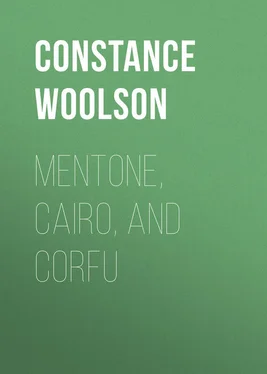Constance Woolson - Mentone, Cairo, and Corfu
Здесь есть возможность читать онлайн «Constance Woolson - Mentone, Cairo, and Corfu» — ознакомительный отрывок электронной книги совершенно бесплатно, а после прочтения отрывка купить полную версию. В некоторых случаях можно слушать аудио, скачать через торрент в формате fb2 и присутствует краткое содержание. ISBN: , Жанр: foreign_prose, на английском языке. Описание произведения, (предисловие) а так же отзывы посетителей доступны на портале библиотеки ЛибКат.
- Название:Mentone, Cairo, and Corfu
- Автор:
- Жанр:
- Год:неизвестен
- ISBN:http://www.gutenberg.org/ebooks/33367
- Рейтинг книги:4 / 5. Голосов: 1
-
Избранное:Добавить в избранное
- Отзывы:
-
Ваша оценка:
- 80
- 1
- 2
- 3
- 4
- 5
Mentone, Cairo, and Corfu: краткое содержание, описание и аннотация
Предлагаем к чтению аннотацию, описание, краткое содержание или предисловие (зависит от того, что написал сам автор книги «Mentone, Cairo, and Corfu»). Если вы не нашли необходимую информацию о книге — напишите в комментариях, мы постараемся отыскать её.
Mentone, Cairo, and Corfu — читать онлайн ознакомительный отрывок
Ниже представлен текст книги, разбитый по страницам. Система сохранения места последней прочитанной страницы, позволяет с удобством читать онлайн бесплатно книгу «Mentone, Cairo, and Corfu», без необходимости каждый раз заново искать на чём Вы остановились. Поставьте закладку, и сможете в любой момент перейти на страницу, на которой закончили чтение.
Интервал:
Закладка:
That evening there was music in the garden; a band of Italian singers chanted one or two songs to the saints, and then ended with a gay Tarantella, which set all the house-maids dancing in the moonlight. We listened to the music, and looked off over the still sea.
"Isn't it beautiful?" said Mrs. Clary. "I think loving Mentone is like loving your lady-love. To you she is all beautiful, and you describe her as such. But perhaps when others see her they say: 'She is by no means all beautiful; she has this or that fault. What do you mean?' Then you answer: 'I love her; therefore to me she is all beautiful. As for her faults, they may be there, but I do not see them: I am blind.'"
That same evening Margaret gave me the following verses which she had written:
Upon this sunny shore
A little space for rest. The care and sorrow,
Sad memory's haunting pain that would not cease,
Are left behind. It is not yet to-morrow.
To-day there falls the dear surprise of peace;
The sky and sea, their broad wings round us sweeping,
Close out the world, and hold us in their keeping.
A little space for rest. Ah! though soon o'er,
How precious is it on the sunny shore!
Upon this sunny shore
A little space for love, while those, our dearest,
Yet linger with us ere they take their flight
To that far world which now doth seem the nearest,
So deep and pure this sky's down-bending light
Slow, one by one, the golden hours are given
A respite ere the earthly ties are riven.
When left alone, how, 'mid our tears, we store
Each breath of their last days upon this shore!
Upon this sunny shore
A little space to wait: the life-bowl broken,
The silver cord unloosed, the mortal name
We bore upon this earth by God's voice spoken,
While at the sound all earthly praise or blame,
Our joys and griefs, alike with gentle sweetness
Fade in the dawn of the next world's completeness.
The hour is thine, dear Lord; we ask no more,
But wait thy summons on the sunny shore.
II
"Thy skies are blue, thy crags as wild,
Thine olive ripe, as when Minerva smiled."
"So having rung that bell once too often, they were all carried off," concluded Inness, as we came up.
"Who?" I asked.
"Look around you, and divine."
We were on Capo San Martino. This, being interpreted, is only Cape Martin; but as we had agreed to use the "dear old names," we could not leave out that of the poor cape only because it happened to have six syllables. We looked around. Before us were ruins – walls built of that unintelligible broken stone mixed at random with mortar, which confounds time, and may be, as a construction, five or five hundred years old.
"They – whoever they were – lived here?" I said.
"Yes."
"And it was from here that they were carried off?"
"It was."
"Were they those interesting Greek Lascaris?" said Mrs. Trescott.
"No."
"The Troglodytes?" suggested Mrs. Clary.
"No."
"The poor old ancient gods and goddesses of the coast?" said Margaret.
"No."
"But who carried them off?" I said. "That is the point. It makes all the difference in the world."
"I know it does," replied Inness; "especially in the case of an elopement. In this case it happened to be Miss Trescott's friends (always with two r's), the Sarrasins. The story is but a Mediterranean version of the boy and the wolf. These ruins are the remains of an ancient convent built in – in the remote Past. The good nuns, after taking possession (perhaps they were inland nuns, and did not know what they were coming to when they came to a shore), began to be in great fear of the sea and Sarrasin sails. They therefore besought the men of Mentone and Roccabruna to fly to their aid if at any time they heard the bell of the chapel ringing rapidly. The men promised, and held themselves in readiness to fly. One night they heard the bell. Then westward ran the men of Mentone, and down the hill came those of Roccabruna, and together they flew out on Capo San Martino to this convent – only to find no Sarrasins at all, but only the nuns in a row upon their knees entreating pardon: they had rung the bell as a test. Not long afterwards the bell rang again, but no one went. This time it really was the Sarrasins, and the nuns were all carried off."
"Very dramatic. The slight discrepancy that this happened to be a monastery for monks makes no difference: who cares for details!" said Verney, who, under the pretence of sketching the ruins, was making his eighth portrait of Janet. He said of these little pencil portraits that he "threw them in." Janet was therefore thrown into the Red Rocks, the "old town," the Bone Caverns, the Pont St. Louis, Dr. Bennet's garden, the cemetery, Capo San Martino, and before we finished into Roccabruna, Castellare, Monaco, Dolce Acqua, Sant' Agnese, and the old Roman Trophy at Turbia.
Leaving the ruins, we went down to the point, where the cape juts out sharply into the sea, forming the western boundary of the Mentone bay. Opposite, on the eastern point, lay blanche Bordighera, fair and silvery as ever in the sunshine. We found the Professor on the point examining the rocks.
"This is a formation similar to that which we may see in process of construction at the present moment off the coast of Florida," he explained.
"Not coquina ?" cried Miss Graves, instantly going down and selecting a large fragment.
"It is conglomerate," replied the Professor, disappearing around the cliff corner, walking on little knobs of rock, and almost into the Mediterranean in his eagerness.
"That word conglomerate is one of the most useful terms I know," said Inness. "It covers everything: like Renaissance."
"The rock is also called pudding-stone," said Verney.
"Away with pudding-stone! we will have none of it. We are nothing if not dignified, are we, Miss Elaine?" said Inness, turning to that young lady, who was bestowing upon him the boon of her society for the happy afternoon.
"I am sure I have always thought you had a great deal of dignity, Mr. Inness," replied Miss Elaine, with her sweetest smile.
We sat down on the rocks and looked at the blue sea. "It is commonplace to be continually calling it blue," I said; "but it is inevitable, for no one can look at it without thinking of its color."
"It has seen so much," said Mrs. Clary, in her earnest way; "it has carried the fleets of all antiquity. The Egyptians, the Greeks, the Phœnicians, the Carthaginians, and the Romans passed to and fro across it; the Apostles sailed over it; yet it looks as fresh and young and untraversed as though created yesterday."
"It certainly is the fairest water in the world," said Janet. "It must be the reflection of heaven."
"It is the proportion of salt," said the Professor, who had come back around the rock corner on the knobs. "A larger amount of salt is held in solution in the Mediterranean than in the Atlantic. It is a very deep body of water, too, along this coast: at Nice it was found to be three thousand feet deep only a few yards from the shore."
"These Mediterranean sailors are such cowards," said Inness. "At the first sign of a storm they all come scudding in. If the Phœnicians were like them, another boyhood illusion is gone! However, since they demolished William Tell, I have not much cared."
"The Mediterranean sailors of the past were probably, like those of the present, obliged to come scudding in," said Verney, "because the winds were so uncertain and variable. They use lateen-sails for the same reason, because they can be let down by the run; all the coasting xebecs and feluccas use them."
Читать дальшеИнтервал:
Закладка:
Похожие книги на «Mentone, Cairo, and Corfu»
Представляем Вашему вниманию похожие книги на «Mentone, Cairo, and Corfu» списком для выбора. Мы отобрали схожую по названию и смыслу литературу в надежде предоставить читателям больше вариантов отыскать новые, интересные, ещё непрочитанные произведения.
Обсуждение, отзывы о книге «Mentone, Cairo, and Corfu» и просто собственные мнения читателей. Оставьте ваши комментарии, напишите, что Вы думаете о произведении, его смысле или главных героях. Укажите что конкретно понравилось, а что нет, и почему Вы так считаете.












